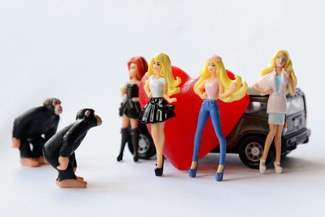When it comes to advertising, do monkeys and humans have the same taste?
 While we humans may be used to seeing a scantily clad man or woman touting the bottle of perfume of a particular brand, how do monkeys feel about sex and notoriety in advertising? Sure, amongst the ranks of crazy research, this study certainly has its place, but it does nevertheless raise an interesting question: can we induce brand preferences in monkeys, as we can in humans?
While we humans may be used to seeing a scantily clad man or woman touting the bottle of perfume of a particular brand, how do monkeys feel about sex and notoriety in advertising? Sure, amongst the ranks of crazy research, this study certainly has its place, but it does nevertheless raise an interesting question: can we induce brand preferences in monkeys, as we can in humans?As a preamble to their study, researchers at the Universities of Stanford, Colorado – Boulder, Durham and Pennsylvania remind us that sexual representations and social status are always a reliable means of arousing consumer desire. Many experiments have shown that explicit sexual content in an ad increases purchase intent for the brand. The same is true when the product is associated with an individual of high social status. For example, George Clooney and his “What else?” ads for Nespresso... And what about the perfume ads that often employ both strategies... But exactly why these strategies are so effective is still unclear.
Some researchers believe that our sensitivity to sex and social status are shaped by experience and rooted in culture. Others hypothesize that ancestral biological mechanisms are at work (primitive impulses). Adopting this second, evolutionary point of view, the research team studied the behavior of 10 rhesus macaques (5 females, 5 males) against brand logos. Keep in mind that these are very social monkeys. For example, they show a rudimentary ability to understand the intentions of their peers. Studies have also shown that they can give up food rewards in exchange for images that are socially relevant to them (photos of male or female genitals or the faces of high status males). As the authors of the study point out, “analogous” research has shown that American students prefer to see a naked woman over money...
The hypothesis is that receptiveness to sex and notoriety in ads comes from the spontaneous activation of neural circuits that process social information in association with neural circuits that process information about the brand. Basically, through repeated associations, information about the brand (including the logo) would eventually become a priority, just like the social stimuli. Can simple conditioning lead to a preference for brands that use sex and notoriety? To answer this question, let’s look at the logos selected by the 10 rhesus macaques.
The researchers first showed the different logos associated with either an image of a male monkey with a high social status, a male monkey of lower status, or the genitals of a female macaque. The monkeys then had to select their favorite logo (this time shown without the associated image) on a touch screen. What did they choose? The monkeys showed a preference for the brands that were previously associated with the images of female genital organs and the faces of dominant males. This proves the power of “positive" association.
According to the authors: “the data provides compelling evidence that some types of social information can be used to induce preferences for brand logos in nonhuman primates, just as in humans.” If they insist that our preference for brands associated with sex and social status can be explained by a strong biological tendency, they indicate that our behavioral responses (should I buy it or not?) may be influenced by a complex decision-making mechanism that is linked to our social experience and culture.
Source: Acikalin MY, Watson KK, Fitzsimons GJ, Platt ML, "Rhesus macaques form preferences for brand logos through sex and social status based advertising”, in PLoS ONE, Febrary 2018







